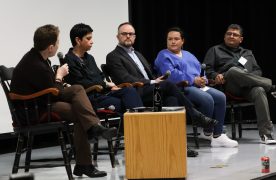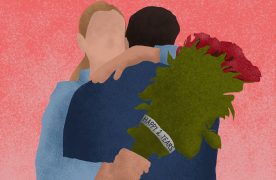Though happiness may not be a top trending topic on Twitter, an analysis suggested people’s Tweets may provide insight to their moods.
Alex Davies, a doctoral student at Cambridge University, created a “Twitter Happiness Map” to interpret the mood of social networkers’ posts as a way of assessing the happiness of states and countries.
The top five happiest tweeting countries are Germany, the Netherlands, Mexico, the United States and Denmark, according to the results.
Massachusetts is the eighth happiest state in the United States.
While the map determines whether tweeters are happy or not, it does not examine the causes of their happiness, Davies said.
In addition to the map, Davies’ analysis includes words correlated with happiness or sadness in each analyzed country.
The words correlated with happiness include birthday, Boston, weekend and love, while words associated with sadness are lonely, sucks, hate and ripped.
“This lets us discover useful information about what words are used for happiness and sadness of tweets and how this differs between locations,” Davies said in an email.
The Twitter map uses a statistical model to determine which tweets are happy or sad and then ranks countries followed by states by the number of positive or negative tweets in the region.
“All this means of course, is that people in a particular country tweet more happy things, and doesn’t necessarily reflect the underlying happiness of the country,” Davies said. “But it does reflect who tweets in that area, what they choose to tweet about and how they tweet.”
The development of this program that compiles information from online social communities into some form of analysis is an impressive step forward, said Catherine Caldwell-Harris, a Boston University associate professor of psychology.
“Americans, more than other cultures, are said to display an upbeat, positive style in their communications with others, for purposes of relationship and impression management,” Caldwell-Harris said.
Davies does not assume, however, that this is a perfect model to be used in psychological analyses.
“This map provides a starting point for more precise systems that can determine specifically what people are happy or sad about in particular places,” he said.
While some students said this new model is an interesting concept, many said they were unsure of how accurate the results were.
“I think it’s a great idea, but I’m not sure if it can prove which state has happier people,” said Dan Wisselman, a sophomore in the School of Hospitality Administration.
“There’s more to happiness than what people will tweet.”
Anna Diorio, a freshman in the College of Arts and Sciences, said she was also wary about the results of the study.
“Those who tweet constantly are obviously not too depressed. There has to be a certain level of narcissism to expect people to read your tweets,” Diorio said.
“It’s not necessarily good to determine a region’s definitive happiness, but it is an interesting way to show moods among tweeters and opens a lot of doors to future social networking studies.”
This is an account occasionally used by the Daily Free Press editors to post archived posts from previous iterations of the site or otherwise for special circumstance publications. See authorship info on the byline at the top of the page.












